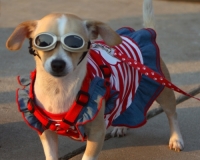It’s the dog days of summer—but Independence Day fireworks aren’t a rite of summer that our pets particularly look forward to. Whether you take your dog to watch the rockets or leave your pal at home, here’s how to keep your four-footed friend safe and feeling secure as the skies light up.
Whether you stay in or go out, the Fourth can be a traumatic time for domestic pets, especially dogs. If you know from past experience that your dog tends to freak out with noises such as thunderstorms or fireworks, the best thing you can do is establish a behavior modification program prior to the Fourth, says Dr. Nonnie Greene, a veterinarian at Seneca Animal Hospital on Taylorsville Road in the Highlands. “Some dogs are noise-phobic, and they're so afraid.” She says that dogs may react in a variety of ways—from destroying things out of panic to hiding and everything in between. “I think anyone who's had a panic attack can feel sorry for their animals because there's really nothing you can do to talk yourself out of it. Dogs have panic attacks too, and they're real panic attacks. A dog having a panic attack often is destructive—might tear a couch apart, tear out the back wall, tear up linoleum. They can do a lot of damage inside a house.”
Even if you have your pup outside or in an empty room, destruction can still occur. “They can also hurt themselves as they tear out their nails and have bloody nails…urinate, defecate, drool,” adds Dr. Greene. “People will find big puddles of drool and not know where it came from. If you see that, it’s a red flag.” She adds that it’s similar to separation anxiety. “When their owners leave for work, people think their dogs are mad at them. It’s not that they couldn't hold themselves or that they’re mad at you, but it's that they were panicked.” Such separation reactions are seen more frequently in rescue dogs that have already experienced abandonment.
If you don’t have time to train your dog to deal with noise—and early July isn’t the best time to start for the upcoming weekend—leaving the TV on or playing music loudly might help cover up the noise of the fireworks. Dr. Greene also advises owners distract their pets if possible, leaving them lots of things to engage themselves, such as favorite toys and toys with edible treats in them. Or, she says, some dogs are better in their crates or a safe enclosed area.
But what if your dog feels most secure by your side, and you’re heading out? Dr. Greene acknowledges that some dogs are fine, but says that she sees a lot of dogs mentally affected by the otherwise innocent outing a day later. “I think it's great that people love their dogs and want to socialize with them,” she says, “but I think they’re better off at home usually.”
Of course, no matter how well you and your pet communicate, it’s hard to know exactly what a dog is experiencing, as it’s hard to measure a particular dog’s hearing. (Dogs typically have superior hearing to that of humans, especially in certain pitch ranges.) Still, says Dr. Greene, “If it's too loud for you, it's probably too loud for your dog. If you're uncomfortable with the smoke and fumes and noise, I wouldn't expose a dog to it.” Even in the backyard, hazards abound. “When I worked in an emergency clinic, the Fourth of July was our heaviest load—more than any other holiday—from dogs that had breathed in the fumes from the fireworks.” She cites even the non-sparkling “black snake” fireworks and tells a heartbreaking tale of a pet that got too close—even just looking. “They’re fascinated with the worms, but I saw a dog that died from breathing in the fumes. It was a horrible way to die. If you don't want to breathe it, you don't want them to breathe it.”
Even beyond the holiday weekend, the heat can affect pets—not just dogs—in ways we may not normally consider. “They live inside, and people bring them out,” says Dr. Greene. “They’ve been on the carpet, but then they go out on the hot concrete. You don't realize how your dog, with its tender pads, feels. We see a lot of pad injuries—blisters—and that takes a long time to heal.” She advises pet lovers to be cognizant that dogs may not be having all the fun that we do in the summer. “We hear a lot about animals in hot cars and dogs eating hot dogs—it can give them diarrhea—but you don't think about the sidewalk as much because we have our shoes on.”
is located at 2706 Taylorsville Road, across from Bowman Field. Its phone number is 458-1161.
Contact the author at
or
.
Photo: Flickr/


